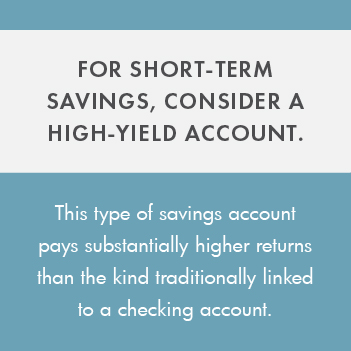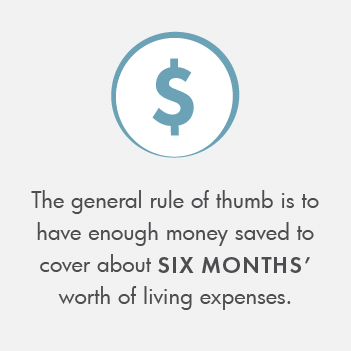Inflation means the average cost of goods and services is on the rise. While a steady increase is to be expected, the consumer price index rose nearly 9% in 2022—the sharpest spike in 40 years. What does this mean for your personal finances? Our credit union has insight into how inflation affects saving and budgeting, as well as tips for maintaining your short- and long-term financial health.
How does inflation affect saving money?
While inflation is normal, it does affect how you save for the future. Here's how you can ensure you have enough money down the road as you anticipate your cost of living to be higher than it is today.Know how much you need to earn in interest
If your savings account earns less in interest than the rate of inflation, the money you put aside won't have the same buying power as the day you deposited it.
Let's say you put $1,000 into a savings account that pays 1% in interest, but inflation is up 9%. After a year, you'll have $1,010 in your savings account.
While you gained $10, you'd actually need $1,090 to have the same buying power you started with. To prevent this from happening, your savings should grow at the same rate as inflation—preferably slightly faster.
Consider high-yield savings accounts
For short-term savings, consider a high-yield account. This type of savings account pays substantially higher returns than the kind traditionally linked to a checking account. CCCU offers money market accounts and share certificates, allowing members to earn more interest, helping them stay ahead of inflation. CCCU also offers a high-yield Apex Checking account, their most popular savings product!Contribute to a retirement fund
Though it depends on your risk tolerance and specific investments, interest earned on stocks has historically been higher than the rate of inflation. With that said, contributing to a retirement fund is still a wise choice.Whether it's an employer-matched 401(k) or a tax-advantaged IRA, this is one of the best ways to make sure you have plenty of money saved decades down the road.
Here are 3 Things to Consider When Opening a Roth IRA.
Recalculate your emergency fund
Another thing to keep in mind is your emergency fund. The general rule of thumb is to have enough money saved to cover about six months' worth of living expenses. Since your cost of living might be higher due to inflation, you may want to put a little extra aside to be safe.
How does inflation affect budgeting?
The financial impact of things like buying a home, moving to a new city, and having a child often call for budget changes. When inflation results in a spike in the cost of living, you'll want to be similarly strategic about your spending habits.
How much should I budget for inflation?
While inflation is up almost 9%, this is just an average. Your personal inflation rate won't be exactly the same as the next person's. For instance, if you bike to work or cook most meals at home, you won't feel the hit of rising gas and restaurant prices. When budgeting for inflation, it's sometimes helpful to start by simply tracking how much you're currently spending each month and comparing it to the previous year. If you're spending 7% more this year than last year, that's your personal inflation rate. For some, the simple act of creating and sticking to a budget can make up the difference.
Here are 5 Personal Budgeting Apps that make tracking your spending much easier.
Cutting costs during inflation
There are a few simple ways to reduce your monthly expenses. If you're carrying debt from a mortgage, a car loan, or credit card balances, it might be a good idea to refinance for a lower interest rate or get a 0% balance transfer. You could shave off a few hundred dollars or more per month in interest alone. Beyond that, you might consider canceling subscriptions you hardly use, such as streaming services, magazines, and mobile apps. You may also be able to save money on things like utility bills and insurance by shopping around for quotes. Planning your meals and sticking to a grocery list can help you cut down on food costs too.
CCCU makes managing your finances easy
At CCCU, we help members streamline their finances, make wise money choices, and plan for the future. Our Oregon credit union offers high-yield savings accounts, tax-advantaged retirement plans, college savings accounts, first-time homebuyer accounts, and holiday savings accounts. We serve members who live, work, attend school, or worship in Multnomah, Clackamas, Yamhill, Washington, Columbia, Clark, Skamania, and Hood River counties. With three branches in Portland proper and one in Hood River, plus upwards of 5,600+ CO-OP Shared Branches, convenient mobile banking, and nationwide surcharge-free CO-OP ATMs, CCCU makes it easy to manage your finances.
Join our credit union today!





